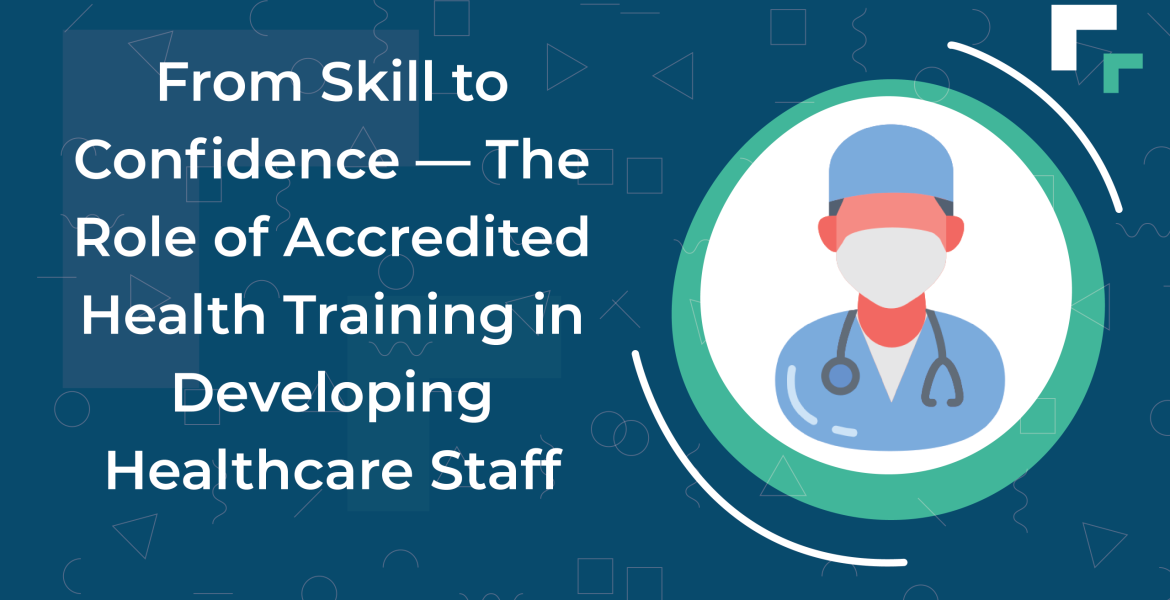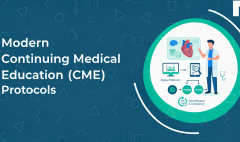From Skill to Confidence — The Role of Accredited Health Training in Developing Healthcare Staff


From Skill to Confidence — The Role of Accredited Health Training in Developing Healthcare Staff
Introduction
In the healthcare sector, one cannot rely solely on academic degrees or previous work experience. Science evolves day by day, and technologies change at an astonishing pace, making accredited healthcare training an indispensable necessity for building a workforce capable of meeting challenges.
Accredited training not only enhances skills but also instills confidence in healthcare practitioners, enabling them to provide safe and effective care in every situation.
What is Accredited Healthcare Training?
Accredited healthcare training refers to any training program conducted under the supervision of official bodies or authorities that recognize its quality and scientific content, such as Ministries of Health, medical councils, or professional associations.
These programs ensure that trainees receive up to date, accredited education based on global healthcare standards.
The Importance of Continuous Training in Healthcare
The healthcare sector is among the most in need of constant knowledge and skill updates because mistakes directly affect human lives.
What was considered correct practice a few years ago may now be ineffective or even dangerous.
Continuous training is therefore vital to:
- Keep up with the latest medical practices and protocols.
- Understand modern technological developments, such as artificial intelligence in diagnostics.
- Reduce errors and improve performance quality.
- Build a workforce that is more resilient and confident during health crises and emergencies.
Every additional hour of healthcare training translates into safer care and a better-prepared organization.
Professional Accreditation and Continuing Medical Education (CME) Hours
In Saudi Arabia, the Saudi Commission for Health Specialties (SCFHS) oversees the quality of competencies in the healthcare field through the professional accreditation system.
Continuing Medical Education (CME) hours are a key part of this system.
These hours represent the ongoing effort a healthcare practitioner makes to update their knowledge and skills and are a requirement for renewing professional classification or registration with the commission.
Every healthcare professional doctor, nurse, technician, or specialist is required to obtain a specific number of CME hours annually through SCFHS-accredited training programs.
This system ensures that every practitioner remains up to date with the latest standards and scientific developments in their specialty.
It also promotes a culture of lifelong learning within healthcare institutions, directly reflecting on the quality of patient care.
Example:
A participant in an SCFHS-accredited course earns officially recorded CME hours in their professional electronic profile at the commission.
Thus, accredited healthcare training is not only a learning opportunity but also a regulatory requirement for building a sustainable professional career and gaining officially recognized professional trust.
From Skill to Confidence: The Real Impact of Accredited Training
Skills can be gained through experience, but confidence comes only from knowledge and structured practice.
A healthcare practitioner receiving accredited training from a trusted entity like SCFHS knows they are working according to high scientific and professional standards, enhancing their accuracy and peace of mind at work.
Accredited training also improves teamwork within medical teams, as everyone works within a unified professional framework and standardized practices.
Patients, in turn, feel confident knowing that their caregivers are officially accredited and continuously trained to ensure competence.
What Makes Healthcare Training Effective?
Not all training achieves the desired outcome. Effective healthcare training should combine scientific content and practical application, and it must be accredited by a competent authority.
Key elements include:
- Up to date scientific content aligned with global developments.
- Realistic practical simulations for clinical skill application.
- Specialized academic supervision from accredited trainers.
- Evaluation and follow-up systems to measure training impact.
- Official accreditation from SCFHS or equivalent bodies to ensure recognition of training hours.
Impact of Accredited Training on Healthcare Quality
Good healthcare training not only improves individual skills but also raises overall institutional performance.
When all team members are familiar with the latest protocols, services become safer and more precise.
Research shows that institutions investing in accredited training achieve:
- A reduction in medical errors.
- Improved emergency response times.
- Increased patient satisfaction and trust in the facility.
In short, accredited healthcare training is an investment in the people who make a difference within the healthcare system.
Conclusion
“From skill to confidence” is not just a phrase; it is a continuous professional journey for every committed healthcare practitioner.
Accredited healthcare training, especially that recognized by the Saudi Commission for Health Specialties (SCFHS) is key to developing professional competence and maintaining trust between practitioner and patient.
In a rapidly evolving world, continuous learning and CME hours serve as a passport to a safer and more distinguished healthcare future.
Frequently Asked Questions (FAQs)
- What are Continuing Medical Education (CME) hours?
CME hours are training or educational hours a healthcare practitioner completes annually to update their knowledge and skills, overseen by the Saudi Commission for Health Specialties (SCFHS). - Do all training courses grant CME hours?
No, only courses officially accredited by SCFHS or recognized authorities grant certified CME hours. - What is the benefit of obtaining CME hours for healthcare practitioners?
These hours are used to renew professional registration or classification and serve as proof of the practitioner’s ongoing professional development. - How many CME hours are required annually by SCFHS?
The number varies by profession and specialty, usually ranging from 20 to 40 CME hours annually according to the commission’s requirements. - Can CME hours be earned through online training?
Yes, SCFHS provides many accredited online courses that grant officially recognized CME hours, also available through the Mena Knowledge Center for training, accredited by the commission.

